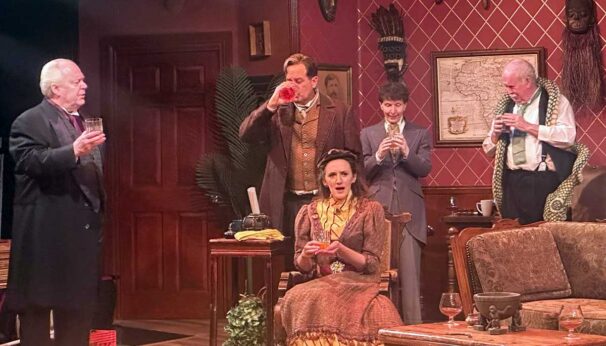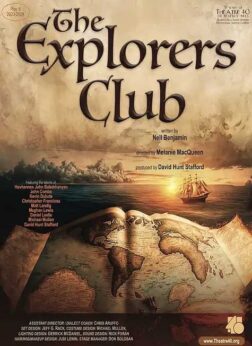
BEVERLY HILLS, Calif. — Victorian England in the 1860s and ’70s represented the height of the British Empire, a time when this devout Christian nation was torn apart by Darwinian science, which in turn inspired, in part, the revolutionary dialectical materialism of Marxism. Marx wanted to dedicate Das Kapital to Darwin, but the evolutionist politely declined the honor as not wanting his theories politicized.
Science, discovery, theology, sexism, totemism, preening pride, colonialism, empire, war, treason!—it’s all on comedic display in Nell Benjamin’s nine-character romp of ideas and manners, The Explorers Club. Curiously, it bears a certain resemblance to George Bernard Shaw’s Misalliance also currently playing in the L.A. area now—a comedy lampooning a slightly later (Edwardian) set of British mores about men and women, class and status.
The play is set in London in 1879. The prestigious Explorers Club, whose members are invited from time to time to present their findings to none less than Queen Victoria herself in a private audience, is presently in crisis. The president, daring, dashing polar expeditionist Harry Percy, is away on a dangerous escapade in the frozen north, and acting president Lucius Fretway has invited a promising young female explorer, Philida Spotte-Hume to lecture on her discovery of the lost city of Pahatlabong, whose tribesman are the NaKong. In fact, she has brought the exotic Luigi—her name for him—to display. It was, after all, the era of Barnum’s circuses, where human beings with non-western features, or with some physical peculiarity like conjoined twins, were often showcased for public amusement (and profit).
Based on her fascinating and important find, Fretway proposes to admit her, but this has always been a male-exclusive club where scientific findings are generously feted with chummy drinks and cigars. The membership are generally in a pique at this time because their bartender is out on personal leave, and besides, he is a dreadful mixologist.

Opinions are divided on the new candidate for membership. Fretway yearns for some female presence and has his heart set on wooing Philida himself. Professor Sloane, a Biblical archeologist and overall pill who sees everything through his anti-Darwinian Christological lens, opposes her admission on principle. Male dominance is truly a pillar of the British Empire: Would her membership somehow undermine the very fabric of social cohesion?
Fretway specializes in botany and believes he has discovered new plants—one he is naming in honor of Philida. Professor Cope walks about with his beloved, misunderstood cobra draped around his shoulders. Sloane believes the Irish are the true descendants of the Ten Lost Tribes of Israel (why are so many of them named “Dan,” after all?) and urges them to emigrate en masse to Palestine (they don’t take kindly to this notion). And Professor Walling has some trained rodents in a wicker cage. Sadly, he has trained them all too well: They have learned how to disengage the latch to their cage and have escaped—one of them, his favorite, quickly gobbled up by the cobra. These are the preposterous men who instinctively raise their cups together to toast “Science!”
It didn’t take me long to imagine the playwright might have uncovered a long-lost treatment for a hilarious Gilbert and Sullivan concoction. And just then, Harry Percy, the swashbuckling explorer who now claims he is the first to have discovered the East Pole (“To Science!”), appears in an outlandish, feathered naval captain’s hat straight out of H.M.S. Pinafore. He even admits it’s a leftover costume from an amateur production of the G&S operetta that he appeared in—unlikely historically, as that work premiered only the year before, in 1878, but certainly nailing the period to a T.
The scenes with Luigi (the gifted Armenian-American Hovhannes John Babakhanyan) might strike some playgoers as objectifying the “primitive” races—which would certainly have been in keeping with the epoch, if not our own day. But as the plot unfolds, it turns out that Luigi has certain skills and knowledge that are highly beneficial to society—the science of Indigenous civilization that he freely imparts to this crowd of bumbling poseurs. And it also turns out that Ms. Spotte-Hume is the very model of a modern major anti-imperialist, who refuses to disclose her research and maps to the British authorities, who out of overreaction to some social offense have resolved to level Pahatlabong and slaughter the KaMong people.
Well, I’ve probably given away too much already, so I’ll stop there and hand the script over to the director, Melanie MacQueen:
“The Explorers Club points a wagging finger at sexism, racism, classism, and probably a few other ‘isms.’ Of course, Victorian England is hardly the only society to suffer from such things—which exist today as much as yesterday, and in many places besides England. Humor is one of the best weapons to puncture pomposity—always has been, always will be. Not only that, it’s just ‘jolly good’ fun! So, enjoy a laugh as we enter the absurd, ‘ism’ filled world of the Explorers even while realizing we’re in our own absurd ‘ism’ filled time. And while we’re at it—To Science!”
Playwright Nell Benjamin has been sort of hiding in plain sight. The Explorers Club debuted off-Broadway in 2013, was nominated for the Drama Desk Award, and received an Outer Critics Circle Award for Outstanding Off-Broadway Play. She is also noted as a composer and lyricist, frequently collaborating with her husband, Laurence O’Keefe. She was nominated for a Tony Award as lyricist and composer for Legally Blonde: the Musical, and also as lyricist for Mean Girls. She was an executive producer on the 2024 Mean Girls movie.
 The cast includes David Hunt Stafford, Matt Landig, Christopher Franciosa, John Combs, Meghan Lewis, Hovhannes John Babakhanyan, Kevin Dulude, Daniel Leslie, and Michael Mullen. They are having such a good time with this engaging material, and it shows. Melanie MacQueen has worked wonders with her cast, and it’s a delight from beginning to end.
The cast includes David Hunt Stafford, Matt Landig, Christopher Franciosa, John Combs, Meghan Lewis, Hovhannes John Babakhanyan, Kevin Dulude, Daniel Leslie, and Michael Mullen. They are having such a good time with this engaging material, and it shows. Melanie MacQueen has worked wonders with her cast, and it’s a delight from beginning to end.
The stage manager is Don Solosan. Set design is by Theatre Forty’s reliable Jeff G. Rack, who has outdone himself this time with his atmospheric, detailed invention. Costume design is by Michael Mullen, hair/wig/make-up design by Judi Lewin, and assistant director is Chris Aruffo.
The Explorers Club plays through June 23 at Theatre Forty, 241 S. Moreno Dr., Beverly Hills 90212, in the Mary Levin Cutler Theatre. The venue is on the campus of Beverly Hills High School. Free parking is available in the parking lot beneath the theatre. To access parking, enter through the driveway at the intersection of Durant and Moreno Drives. Performances are Thurs. Fri. and Sat. at 7:30 p.m., and Sun. at 2:00 p.m. Dark on Fri., June 7; and on Sat., June 22, there will be a 2 p.m. matinee and no evening show. For reservations call (310) 364-0535, or go to the company website.
I have found Theatre Forty to be overall among the most consistently professional and satisfying experiences on the Los Angeles stage. I wish more people knew about them. I try to do my part….










